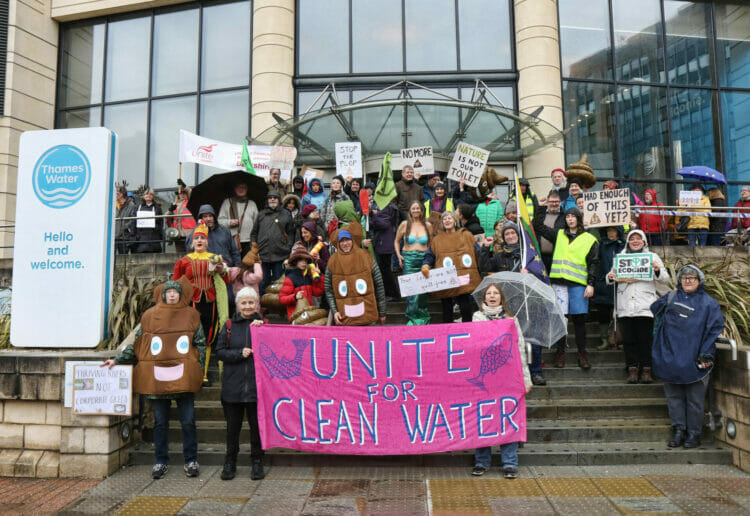ON SATURDAY, protestors took the fight to Thames Water for the second time in as many weeks to rally against the pollution of waterways.
Around 80 people joined Extinction Rebellion in gathering outside Thames Water’s headquarters in Vastern Road, Reading, in a demonstration calling for the end of the practise of letting sewage into waterways.
Protestors heard from a number of speakers, including the Green Party’s Danny McNamara and Extinction Rebellion’s Gillian Fletcher, and a written statement from Hannah Cloke, Professor of Hydrology at the University of Reading.
Attendees also saw a samba performance and a mock ‘punishment’ skit, as well as taking part in singing protest songs.
The protests are part of a wider movement calling for water suppliers across the UK to discontinue the outletting of sewage into waterways.
Many protestors were publicising a weekend of action taking place outside the Houses of Parliament in April, demanding an end to the use of fossil fuels through “citizen-led” democratic means.
It comes as Thames Water closes its public consultation of a “50-year plan” which will set out the future of the company and its practises.
The plans include proposals to reduce the discharge of sewage into waterways, representing a £1.6 billion investment in limiting its environmental impact.
Speaking on the proposals, Nevil Muncaster, strategic resources director at Thames Water, said: “We believe that water belongs to everyone and are committed to safeguarding its future.
“We’re working hard to build resilience and our plan sets out how we intend to meet the challenges ahead including a growing population and more extreme weather conditions, such as drought.
“Finding and fixing leaks is fundamental to our plan and we’re working hard to upgrade our Victorian pipes to meet 21st century demands.”
The current iteration of plans would seek to reduce the total annual duration of discharges by 50% by 2030 compared to a 2020 baseline, and would include an 80% reduction in discharges in particularly sensitive catchments.
Despite this, the proposals would not have an impact on Reading or Wokingham.
Reading East MP Matt Rodda said the water firm’s plan is a step forward, but wanted the company to go further, advocating for: “greater fines for water companies, annual parliamentary scrutiny of DEFRA, Ofwat and the Environment Agency, and a proper plan for reducing raw sewage being discharged.”
One of the attendees, Helen Palmer, came to the protest dressed as e.coli bacteria, and said “Climate change is causing episodes of heavy or intense rainfall in much of the UK, leading to higher risk of river and surface water flooding.”
She said that this in turn: “puts pressure on our antiquated and under-funded sewage systems. Instead of investing, water companies are simply pumping pollution into our waterways.”
Many protestors also contested the rate of bonus pay for executives at the supplier, with Bee, another attendee, saying: “When millions of us are paying so much, our rivers and streams are choked with toxic filth and dying. ”
Sarah Bentley, chief executive of Thames Water, said: “The discharge of untreated sewage is unacceptable, and we are committed to tackling this problem.
“There are no quick fixes– population growth will increase the strain on our sewage network and treatment centres.
“The scale of the challenge demands urgent and systemic reform with a shared undertaking from all stakeholders.”
The Water Resources Management Plan, currently a draft, is currently looking to come into effect in 2024, following the closure of the public consultation on Tuesday, March 21.
The results are set to be sent to the Secretary of State for the Environment in June.
























